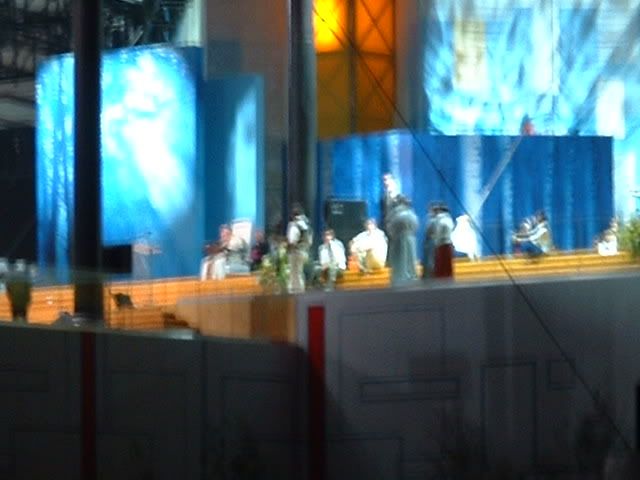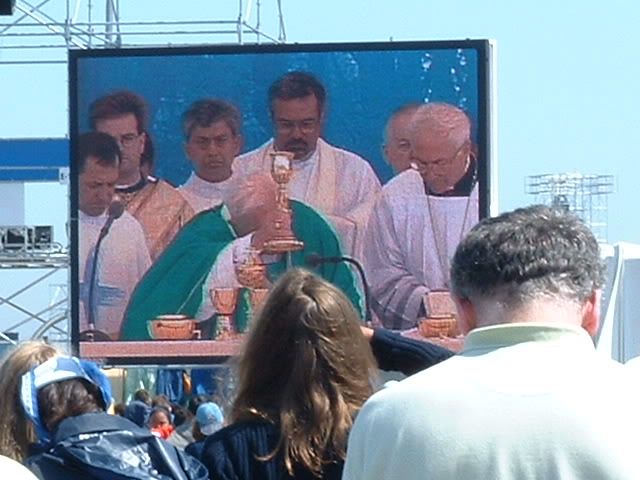
the pope on his chair, while presiding a saturday vigil mass. world youth day 2002, toronto, canada.
when president ronald reagan was first diagnosed with alzheimer's disease, he quickly removed himself from public eye and died in the privacy of his california home.
pope john paul II is likewise being treated in his vatican residence. his health is gently, but clearly, descending, but his doctors say he won't leave his house to go to the hospital.
i'm amazed at his courage. he's living out his old encouragement: "be not afraid!" be not afraid to acknowledge your various limitations. be not afraid to continue tasks given to you, even if you suffer in various ways. be not afraid to pick up from where you've left off. be not afraid to take on uncharted territory, like a new job, or just even a job fair, or a burning, new curiosity that you know will cost you dearly.
trying to read his words in college was like trying to understand heiroglyphics, but you're rewarded with true gems in the end. his thoughts come across as surprisingly easy to relate to. here are some i've come across in the past that i've now piecemealed together as a result of trying to understand why he insists on appearing in public and carrying on his tasks, despite age and illness. from the apostolic letter:
Those who share in Christ's sufferings have before their eyes the Paschal Mystery of the Cross and Resurrection, in which Christ descends, in a first phase, to the ultimate limits of human weakness and impotence: indeed, he dies nailed to the Cross. But if at the same time in this weakness there is accomplished his lifting up, confirmed by the power of the Resurrection, then this means that the weaknesses of all human sufferings are capable of being infused with the same power of God manifested in Christ's Cross. In such a concept, to suffer means to become particularly susceptible, particularly open to the working of the salvific powers of God, offered to humanity in Christ. In him God has confirmed his desire to act especially through suffering, which is man's weakness and emptying of self, and he wishes to make his power known precisely in this weakness and emptying of self. This also explains the exhortation in the First Letter of Peter: "Yet if one suffers as a Christian, let him not be ashamed, but under that name let him glorify God"(75) [ on the christian meaning of human suffering, 1984. ]
the image that comes to my mind here is, again, christ nailed to the cross. we're all familiar with the metaphor that the way jesus was nailed to the cross is similar to when someone opens their arms to embrace you. when you get ready to take on someone like that, all shame is shed and all your attentions are focused on the object of your embrace - thus, weakness and emptying of self.
the other amazing thing about the pope is that he lets his staff tell the media every single little detail of his illness - perhaps to assure catholics, perhaps to show us all how a christian's life is, first and foremost, a witness to jesus christs' presence on earth.
we can say he has to, because that's his job - he's a pastor, a father, not a politician who has to keep up facades. and like a loving father who takes every opportunity to teach his children, he, again, lives out something he said some time ago:
[The elderly] are sometimes foresaken. They suffer because of their old age. They also suffer because of the various troubles that advanced age brings with it. But their greatest suffering is when they do not find the due understanding and gratitude on the part of those from whom they are entitled to expect it. [ the family: center of love and life, general audience, dec. 31, 1978. republished in "the wisdom of john paul II: the pope on life's most vital questions," 1995, p. 84. ]
the holy father is fearless - he's visited over 100 countries and met with key leaders to avert war and send help where it's needed - before the most recent war in iraq, he met with president bush, who respectfully differed with him regarding starting a war there. he brought key african leaders together to stop civil war there. he played a subtle hand in the fall of communism, insisting on visiting his native poland three times until the iron curtain dropped. historians claim that a third of poland's population attended his third visit, enough to turn the polish government.
yet the pope is also human. i'm sure right now he's curiously looking forward to what else god has in store for him.
In old age, how should one face the inevitable decline of life? How should one act in the face of death? The believer knows that his life is in the hands of God: "You, O Lord, hold my lot" (Psalm 16:5)... Man is not the master of life, nor is he the master of death. In life and in death, he has to entrust himself completely to the "good pleasure of the Most High," to His loving plan. [ encyclical: the gospel of life (evangelium vitae), 1995. republished in "the wisdom of john paul II: the pope on life's most vital questions," 1995, p. 86. ]
sometimes when you step back and look at the world, you realize its characters: the politicans and the clergy, the artists and the businessmen, the workers for hire and the housekeepers. the sentries and the students. the teachers and the children. the healers and peacemakers. the outcasts and the troublemakers. the messengers.
the catholic church is one such messenger, and the pope is her leader. by letting us all know, almost at an hourly basis or whenever the media asks, how he is doing, he is not shirking from the responsibility and opportunity he's been given as representative of his highest and dearest hopes. as he delivers a homily in san antonio, texas:
We die in the physical body when all the energies of life are extinguished. We die through sin when love dies in us. Outside of love there is no life. If man opposes love and lives without love, death takes root in his soul and grows. For this reason Christ cries out: "I give you a new commandment: Love one another. Such as my love has been for you, so must your love be for each other" (John 13:34). The cry for love is the cry for life, for the victory of the soul over sin and death. The source of this victory is the Cross of Jesus Christ: His Death and His Resurrection." [ sept. 13, 1987. republished in " the wisdom of john paul II: the pope on life's most vital questions," 1995, p. 90. ]

world youth day 2002, toronto, canada.






